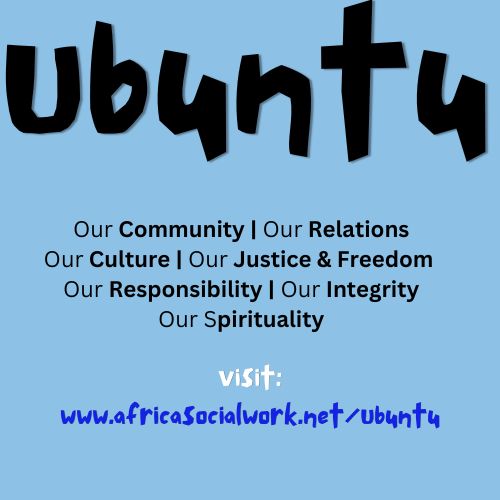
Ubuntu and Social Work Resources
Ubuntu is a collection of values and practices that Black people of Africa view as making people and their communities authentic. While the nuances of these values and practices vary across different ethnic groups, they all point to one thing – an authentic individual human being is part of a larger and more significant relational, communal, societal, environmental and spiritual world. The term ubuntu is expressed differently is several African communities and languages but all referring to the same thing. In Angola, it is known as gimuntu, Botswana (muthu), Burkina Faso (maaya), Burundi (ubuntu), Cameroon (bato), Congo (bantu), Congo Democratic Republic (bomoto/bantu), Cote d’Ivoire (maaya), Equatorial Guinea (maaya), Guinea (maaya), Gambia (maaya), Ghana (biako ye), Kenya (utu/munto/mondo), Liberia (maaya), Malawi (umunthu), Mali (maaya/hadama de ya), Mozambique (vumuntu), Namibia (omundu), Nigeria (mutunchi/iwa/agwa), Rwanda (bantu), Sierra Leonne (maaya), South Africa (ubuntu/botho), Tanzania (utu/obuntu/bumuntu), Uganda (obuntu), Zambia (umunthu/ubuntu) and Zimbabwe (hunhu/unhu/botho/ubuntu). It is also found in other Bantu countries not mentioned here (source: African Journal of Social Work, 2020).
Ubuntu has been selected as a theme for this year’s World Social Work day. This is an acknowledgement of African social work and African knowledges handed to us by our genealogies. In academia, we can say ubuntu is a grand philosophy, with several theories under it. In practice and research, we say it is a way of doing things, a way of working. For the African clients and for African social workers, it is a way of life.
Below is a list of peer reviewed journal articles and books focusing on Ubuntu in social work:
Samkange, S. and Samkange, T. M. (1980). Hunhuism or Ubuntuism: A Zimbabwean Indigenous Political Philosophy. Salisbury: Graham Publishing.
Mugumbate, J. (2020). Samkange’s theory of Ubuntu and its contribution to a decolonised social work pedagogy. In Morley, C. (Ed.), Ablett, P. (Ed.), Noble, C. (Ed.), Cowden, S. (Ed.). Routledge Handbook of Critical Pedagogies. London: Routledge.
Council of Social Workers (Zimbabwe) (CSW) (2012). Social workers code of ethics. Statutory Instrument 146 of 2012.
Chilisa, B. (2012). Indigenous research methodologies. Los Angeles: Sage.
Seehawer, M. K. (2018). Decolonising research in a Sub-Saharan African context: exploring Ubuntu as a foundation for research methodology, ethics and agenda. International Journal of Social Research Methodology, 1-14.
Dziro, C. and Rufurwokuda, A. (2013). Post-institutional integration challenges faced by children who were raised in children’s homes in Zimbabwe: The Case of “Ex-girl” Programme for one children’s home in Harare, Zimbabwe. Greener Journal of Social Sciences, 3, 268-277.
Metz, T. (2016). Recent philosophical approaches to social protection: From capability to Ubuntu.Global Social Policy, 16(2), 132–150
Rankopo, M. J., and Osei-Hwedie, K. (2011). Globalization and Culturally Relevant Social Work: African Perspectives on Indigenization. International Social Work, 1, 137-157.
Tshoose, C. (2009). The emerging role of the constitutional value of ubuntu for informal social security in South Africa. African Journal of Legal Studies, 3, 12–19.
van Breda, A. D. (2019). Developing the notion of Ubuntu as African theory for social work practice. Social Work, 55(4), 439-450.
Whitworth, A. and Wilkinson, K. (2013). Tackling child poverty in South Africa: Implications of ubuntu for the system of social grants. Development Southern Africa,30, 121–134.
Hunhu/ubuntu philosophy as a guide for ethical decision making in social work
Baba Jairos Jiri’s ubuntu models of charity, disability and rehabilitation
The interface between Botho and social work practice in Botswana: towards Afrocentric models
Use the form below to subscibe to Owia Bulletin.
Discover more from Africa Social Work & Development Network | Mtandao waKazi zaJamii naMaendeleo waAfrika
Subscribe to get the latest posts sent to your email.



